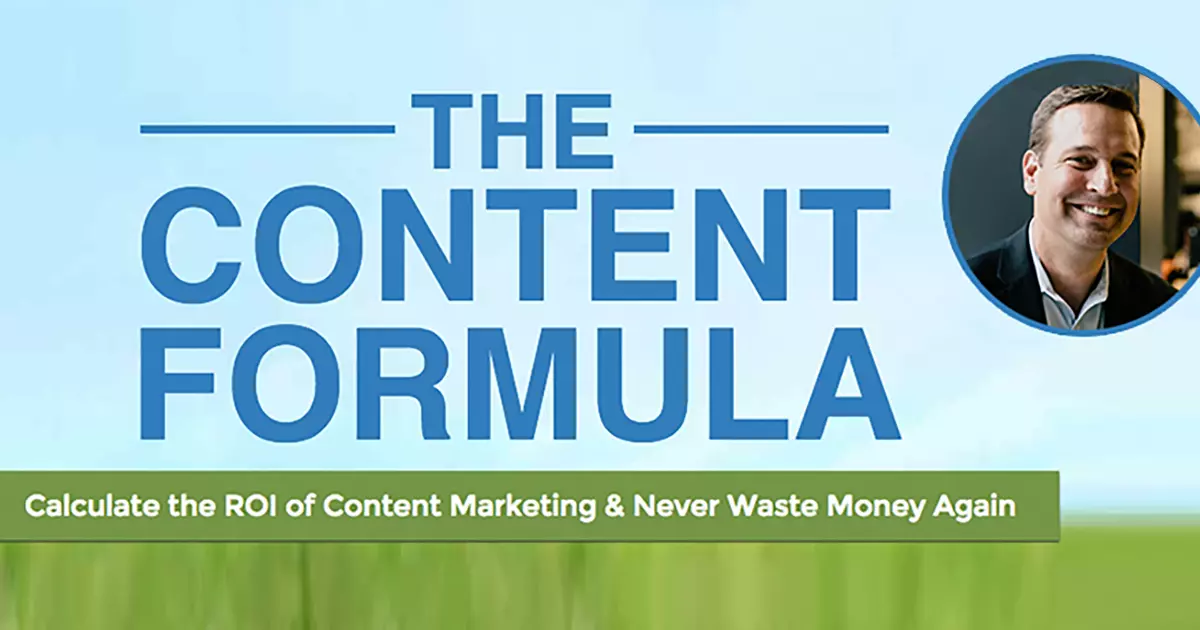Measuring Content Marketing: An Interview with Michael Brenner

Struggling with measuring the ROI of your content marketing program? Get help with Michael Brenner’s new book, The Content Formula.
As a B2B marketer, you’ve seen, read and been exposed to enough content to know there’s certainly no shortage of it. White papers, blog posts, infographics, video, SlideShare. You get my point. You’ve become savvy on ways to repurpose and reuse what you’ve already got — getting the most mileage out of each piece. Even though you can churn out all types of content, it doesn’t mean anything if it’s not reaching your target audience AND helping you reach your goals. But how do you know if you’re logging the right miles and are on the right path?
In Michael Brenner’s new book, The Content Formula, he puts the numbers to actual work — so when you embark on your exciting content marketing journey, you can tie your efforts back to real, measurable KPIs. Maybe even show a little ROI.
Michael was kind enough to answer some of my questions about his book, and provide some helpful tips for B2B marketers just getting started with their content marketing strategy.
What I really liked about your book that's different from the countless blog posts and e-books I've read is that you put formulas to the metrics and not just a list of what to measure. What inspired you to write The Content Formula from this approach?
My co-author, Liz Bedor, and I were inspired to write this book mainly because the question of content marketing comes up so often in conversations I have with marketers. There are still many companies who don't know the ROI of marketing overall. And I have been able to show many clients that content marketing is a much easier way to prove the return on marketing because everything you do in content marketing can be measured.
We didn't just want to make that case, but also provide the actual calculations I've used to help my clients build the business case for content marketing, find the budget from existing and under-performing marketing programs, and then calculate the actual return on that investment.
I’m not a numbers or math person, but you did a great job of simplifying the formulas so they’re easy to understand and actually applicable for people like me. How did you whittle down all of the infinite possibilities of things to measure into what’s most important?
Haha. Yes, I'm not a very math-minded person either. And over the course of working with many different kinds of companies, and making a lot of mistakes, I was able to figure out which metrics really resonated with senior executives and non-marketers. Something as simple as demonstrating the value of organic search traffic is one example. Sales people and CEOs generally understand the value of showing up first for important search terms. And then to show them how they can save the money they are spending on paid search because they don't show up organically, those kind of examples work well with business executives.
As a content marketer, one of my biggest challenges is tying ROI back to the programs I create for clients. It’s especially challenging when you don’t have access to sales data or MQL (marketing qualified lead) numbers/metrics. Do you have any tips for helping to better align marketing and sales, as it relates to content marketing? What is a fallback for a meaningful conversion when the sale itself can’t be measured?
It can be difficult to show ROI when you don't have access to sales or even lead data. So many of our calculations focus on money that can be saved by doing content marketing. One of my favorite calculations is the one about content that currently gets created and never used. If you can shift even a portion of that money into content that gets used and delivers reach and engagement with the target audience, that can have a tremendous impact.
But in the end, I recommend every business should have a marketing measurement process in place to be able to track marketing spend to some form of business results. Sometimes this means you have to make some assumptions and use averages when you don't have access to leads and sales data. In every business where we have looked at content marketing performance vs. traditional marketing approaches, the return on investment can be proven to be much higher.
What are some common pain points you’ve heard from other B2B marketers (or encountered yourself) when trying to calculate the ROI of content marketing? Any tips on how to overcome them?
The most common pain point in measuring content marketing ROI is simply a lack of commitment to measuring results. For some companies, marketing is responsible for execution. Organize an event, do a webinar, issue a press release. Things like that.
Marketers need to hold themselves accountable to measuring results. It's a cultural shift in some organizations, but an important one if marketing wants a seat at the executive table. Marketing can be measured. Content marketing even more so. And when marketing leaders start to do this, they can focus on those activities that drive results.
What advice would you give B2B marketers on strategies or key areas of focus that they can start implementing right away? What are some initial ideas to keep in mind when looking to develop a content marketing plan?
The most important part of getting started in B2B content marketing is building the business case.
We broke the book into three sections: building the business case, getting the budget and measuring results. So having that initial plan, or content marketing mission statement, that is tied to an important goal for the business, is the most important first step.
The mission statement is an easy formula: Your business will become a primary destination for what topic, for which audience, to deliver a defined customer value. And by doing this, you will deliver reach, engagement and conversion of leads and sales you would have never achieved without doing content marketing.
Sounds like a simple formula but this is often very difficult to define clearly.
I have seen that the reason this mission is so important, aside from knowing where to focus, is it allows the whole organization to get aligned around that core focus area and approach.
Any business can do this. And I hope the books helps many companies realize that, as Seth Godin once said, content marketing is all the marketing that's left."
Michael Brenner is CEO of Marketing Insider Group, and co-author of The Content Formula.
Sign Up for our Newsletter - Get agency updates, industry trends and valuable resources delivered directly to you.
Godfrey Team
Godfrey helps complex B2B industries tell their stories in ways that delight their customers.




